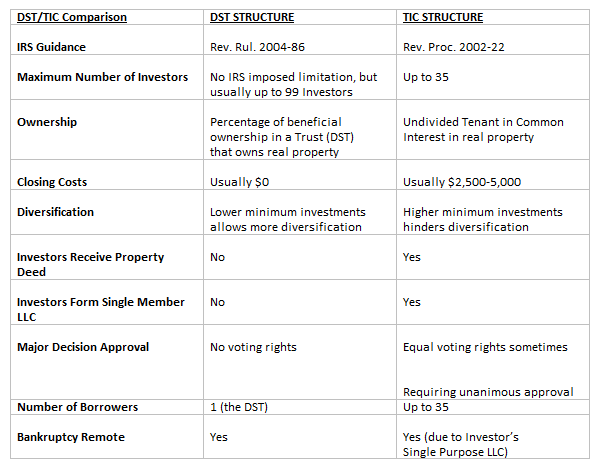Delaware Statutory Trust (DST) vs. Tenant in Common (TIC) Investments
Typically, a DST is limited to 99 investors, and minimum investments are much lower than for a TIC. The DST will own 100 percent of the fee interest in the real estate and hold the deed to the property. Unlike a TIC program, the lender only needs to make one loan to one borrower, and the borrower is the Sponsor or an affiliate of the Sponsor. The investors will receive any potential distributions, appreciation and depreciation (tax shelter). Investors have no vote or say in operations of the property, as it is managed by the Trustee on their behalf. The lender does not need to underwrite any of the investors because they are totally isolated from the operation of the property.
A DST is a separate legal entity created as a trust in which each owner has a “beneficial interest” in the DST and owns an undivided fractional interest in the property. In order for a DST to qualify for a 1031 exchange, the trustee (usually the Sponsor or an affiliate) may not do any of the following:
- Accept contributions from either current or new investors after the offering is closed
- Renegotiate the terms of the existing loans, or borrow any new funds from a third party
- Sell real estate and use the proceeds to acquire new real estate
- Make other than minor repairs that are: 1. normal repair and maintenance 2. minor non-structural improvements and 3. those required by law
- Invest cash held between the distribution dates other than in short-term government debt,
- Retain cash, other than necessary reserves (all cash must be distributed on a current basis)
This is neither an offer to sell nor a solicitation of an offer to buy any security which can only be made by prospectus. Investing in real estate and 1031 exchange replacement properties may not be suitable for all investors and may involve significant risks. These risks include, but are not limited to, lack of liquidity, loss of principal, limited transferability, conflicts of interest and real estate fluctuations based upon a number of factors, which may include changes in interest rates, laws, operating expenses, insurance costs and tenant turnover. Investors should also understand all fees associated with a particular investment and how those fees could affect the overall performance of the investment. Employees of Archer and LightPath Capital, Inc. do not provide tax or legal advice, as such advice can only be provided by a qualified tax or legal professional, who all investors should consult prior to making any investment decision. Archer is a branch office of LightPath Capital, Inc. Securities offered through LightPath Capital, Inc. Member FINRA/SIPC.

